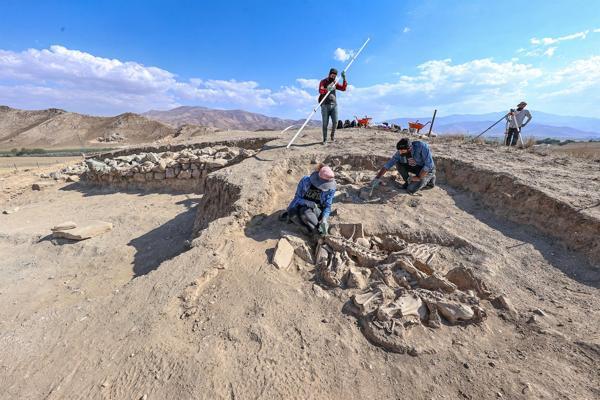Urartian grave excites archaeologists
VAN


The excavations initiated this year in the Çavuştepe Castle, built by the Urartian King Sarduri II, and the necropolis in its northern part, a tomb of a man, believed to have been belonged to an Urartian ruler and buried with his dog, four horses, cattle and sheep, has been found.
Excavations continue in the Çavuştepe Castle, located in the eastern province of Van’s Gürpınar district, and the necropolis in its northern part, with a team of 25 people consisting of anthropologists, archaeologists, art historians, city planners and restorers under the chairmanship of Professor Rafet Çavuşoğlu, the head of the Yüzüncü Yıl University’s Archaeology Department.
The previous excavations in the region brought to light the skeletons of men and women, which date back to 2,777 years, and the skeleton of a 3-year-old child wearing many pieces of jewelry as well as a dragon-headed bracelet on its upper arm.
This year in the same area, a new site has been found where an Urartian ruler was buried with his four horses, dog, cattle and sheep.
It is expected that new information about the burial customs and ruling class of the Urartian period will be obtained from the new tomb, which excited the scientists working in the region.
Speaking to the state-run Anadolu Agency, Çavuşoğlu said that cleaning and conservation works were carried out to repair the damaged areas in Çavuştepe Castle while excavations were carried out in the necropolis.
Çavuşoğlu stated that very different finds were unearthed related to the Urartian burial tradition and archaeology, adding, “This place has always brought firsts to us about the Urartian burial tradition. Today, we have encountered one of those firsts. In the studies we carried out with our expert team, we found an in-situ [in its original place] tomb. We saw a human being buried with his animals. Pieces of pottery were found right next to it. Here we also found an oil lamp with a bulb that we have never seen before. It also gives important tips about lighting.”
Stating that the newly found area excited the excavation team, Çavuşoğlu said: “The burial and in-situ condition of a human buried with his horses is a situation we encountered for the first time. The work is still ongoing. We will reveal his nobility in the coming days. It shows that the person buried with his four horses was someone important. We think he was a ruling-class or high-ranking military person associated with horses.”
Associate Professor of Archaeology Hakan Yilmaz said: “We discovered an interesting find this year. The fact that the person was buried with his horses is interesting. There are four horses. The skulls of the two horses are intact and both have lower jaws. There are human skulls and bones right next to the tomb and next to them are beef bones. We understand that this person was buried with his animals. It is the first find in the Urartian burial tradition that I have ever seen. This tomb belongs to an important person. It is something that surprises us. We will analyze the bones in the laboratory.”
Associate Professor of Archaeology Hanifi Biber, on the other hand, stated that they came across a different burial custom. “The pottery pieces next to the tomb caught my attention. They are of high quality. There are very high-quality ceramics in the Van Museum and these ones are similar to them. The tomb has not been fully opened yet, other finds may come. Therefore, considering his horses and the quality of the ceramics, we understand that he was not an ordinary person and that he was most probably an administrator.”
